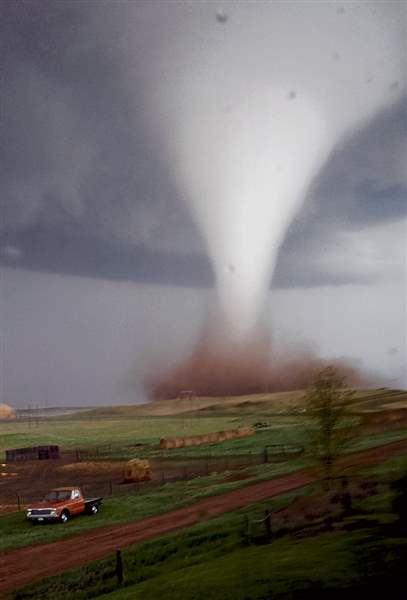
Tornado season is cause to brush up on safety
6/16/2014
ASSOCIATED PRESS

It’s tornado season, and if you don’t have a plan in the event the Lucas County Emergency Management Agency sounds the sirens to alert the public to a tornado watch or warning, now is the time to become schooled about what to do.
In fact, knowing the difference between a tornado watch and warning is a good place to start. The public information officer for the Lucas County EMA and Toledo-Lucas County Health Department, Stacy DeBruyne, said a watch is issued when weather conditions favor the formation of tornadoes, and a warning is issued when a funnel has been sited or is indicated by radar.
“The sirens go off when there is a warning, so when they go off, take cover immediately,” she said.

DeBruyne
It’s wise to prepare an emergency plan in advance. She suggests residents walk through their homes and decide which room is the best for the family to meet in for shelter.
“If everybody is in different parts of the house, then meet in one room. In a house with a basement, then meet in the basement,” she said.
Residents whose homes don’t have basements should go to the lowest level or to the center of a small interior room of the house, she said. Stay away from doors and windows, as debris could crash through and cause injuries. Steer clear of corners, too.
“A corner could come down and hurt someone, so you are safest in the middle” of an interior room, Ms. DeBruyne said.
Anyone outside should find a flat ditch to lay in. If you’re driving, stop the vehicle, she said.
They do it in movies, but “Never try to outrun a tornado. Try to get to a shelter,” she said.
The Ohio Committee for Severe Weather Awareness lists an acronym on the Ohio.gov website to help Buckeye State residents to remember what to do when there is a tornado. DUCK: go Down to the lowest level, get Under something, Cover your head, and Keep in shelter until the storm has passed.
If your television is not tuned to a local station, you want a weather radio. As old-fashioned it seems, Ms. DeBruyne said they continuously broadcast weather reports from the National Oceanic and Atmospheric Administration, or NOAA. For the more technologically advanced, NOAA weather apps for smart phones are available.
A weather radio powered by batteries would come in handy if the electricity goes out. And though many people use candles when the lights are out, Ms. DeBruyne said they pose a fire risk and urges the use of flashlights and battery operated candles.
The health department has guidelines for the public to use to help ensure food, pool, and generator safety during power outages.
"If you use a generator, always make sure it's used outside. If power is out for more than two hours, you should start throwing away food," Ms. DeBruyne said. That's especially so if food has been exposed to temperatures at 40 degrees Fahrenheit or higher for two or more hours. If food has an unusual color, texture, or odor, pitch it.
"When in doubt, throw it out!" the local health department information states.
Remember, if refrigerator doors are kept closed, food will keep for about four hours. Also, never taste food to determine its safety, even if it looks and smells OK. Bacteria that cause food-borne illnesses can begin to quickly grow in foods that sit out at room temperature.
Public pools must close when power is out. When a pool circulation system does not function, water quality is can become unsafe for swimming. That's a good tip for homeowners who have pools, too.
Contact Rose Russell at: rrussell@theblade.com or 419-724-6178.